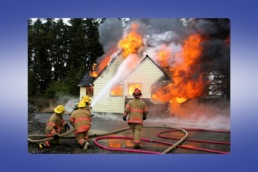What Are the Common Causes of House Fires?
Key Takeaways
- Unattended stoves and grease fires are the primary sources of house fires, highlighting the importance of kitchen safety.
- If not used properly, Space heaters, fireplaces, and furnaces can ignite nearby flammable materials.
- Faulty wiring, overloaded outlets, and outdated systems are common fire hazards.
- Careless handling of cigarettes and other smoking materials can easily start fires, especially near flammable items.
- Candles, lighters, and household solvents can ignite fires if left unattended or improperly stored.
House fires are a serious threat to property and life, causing billions of dollars in damage and thousands of injuries each year.
Understanding the most common causes of house fires can help homeowners take preventative measures to protect their families and property. Here are the primary factors behind residential fires and how they typically start.
1. Cooking Accidents
Cooking is the leading cause of house fires, often due to unattended stoves or ovens. Grease fires are particularly dangerous, as they can ignite quickly and spread rapidly. Leaving cooking food unattended, using flammable materials near heat sources, or overheating oil are common triggers. Simple precautions, such as staying in the kitchen while cooking and keeping flammable items away from burners, can significantly reduce the risk.
2. Heating Equipment
Space heaters, fireplaces, and furnaces are common causes of house fires, especially during colder months. Fires often start when heating equipment is placed too close to combustible materials like curtains, furniture, or bedding. Additionally, poorly maintained chimneys can cause fires due to creosote buildup. Keeping heaters away from flammable items and having chimneys cleaned regularly can help prevent these fires.
3. Electrical Faults
Faulty wiring, overloaded circuits, and malfunctioning appliances are major contributors to house fires. Older homes with outdated electrical systems are especially at risk. Common warning signs include flickering lights, burning smells, and frequently tripped circuit breakers. Regular electrical inspections and avoiding the use of damaged cords or overloaded power strips can help reduce the risk of electrical fires.
4. Smoking Indoors
Smoking materials, such as cigarettes, cigars, and pipes, are a leading cause of fire-related deaths in homes. Fires often start when smoking materials are not fully extinguished or when they come into contact with furniture, bedding, or carpets. Smoking outside and ensuring all materials are properly extinguished can significantly reduce this risk.
5. Candles and Open Flames
Candles, though commonly used for decoration or relaxation, are a frequent cause of house fires. Fires often occur when candles are left burning unattended or placed near flammable materials. Using flameless LED candles or placing candles in secure holders away from curtains and furniture can prevent accidents.
6. Flammable Liquids
Household solvents, gasoline, and cleaning products can ignite easily if stored improperly or exposed to open flames. Storing flammable liquids in well-ventilated areas away from heat sources can help prevent fires. Additionally, using these substances with caution and following safety instructions is crucial.
7. Children Playing with Fire
Children experimenting with matches, lighters, or other flammable objects can unintentionally cause fires. Educating children about the dangers of fire and keeping matches and lighters out of reach are essential safety measures.
Conclusion
House fires are often preventable when homeowners understand and address the common causes. Simple actions, such as staying alert while cooking, maintaining heating and electrical systems, and using open flames safely, can significantly reduce fire risks.
Taking these precautions protects property and saves lives, making fire safety a crucial part of every household’s routine.
FAQs
1. What is the number one cause of house fires?
Cooking accidents, particularly unattended cooking and grease fires, are the leading cause of house fires.
2. How can I prevent electrical fires in my home?
You should regularly inspect your wiring, avoid overloading outlets, and replace damaged cords. It is also recommended that you hire an electrician for periodic inspections.
3. Are space heaters safe to use?
Yes, but they must be placed at least three feet away from flammable materials, used on a stable surface, and turned off when not in use.
4. Can candles really cause house fires?
Yes, especially if left unattended or placed near flammable items like curtains or furniture. Flameless LED candles are a safer alternative.
